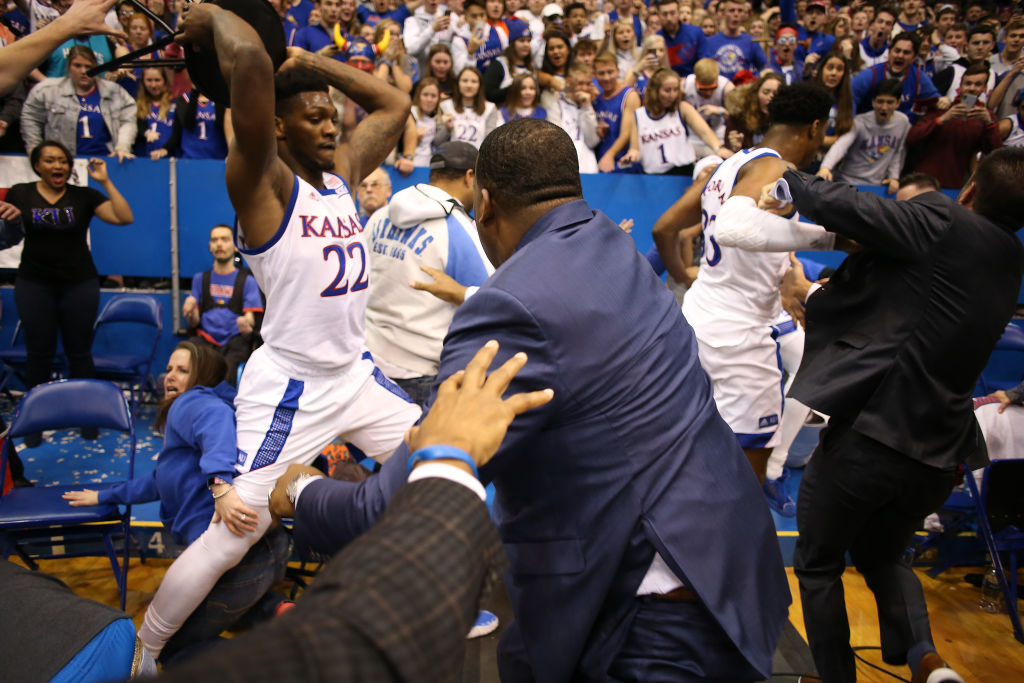Was Kansas Basketball Fight 'Criminal'? Silvio De Sousa's Role Scrutinized
People Are Trying To Criminalize Kansas Basketball Player Fighting In Wild Game-Ending Brawl

Source: Jamie Squire / Getty
The fallout surrounding Tuesday night’s ugly game-ending brawl between the men’s basketball teams from the University of Kansas and Kansas State University has taken a turn for the worse as some college hoops analysts have framed the fight’s narrative in a criminal context.
MORE: Walter McCarty Fired: University Of Evansville Dismisses Basketball Coach Over Title IX Policy
Kansas’ forward Silvio De Sousa was at the center of the brawl that began at the end of a lopsided rout between the two interstate rivals on the Jayhawks’ home court. An indelible image was captured of the 6-foot-9-inch sophomore holding a stool above his 245-pound body and posturing as if he was going to slam it down, prompting one of the biggest names in college basketball punditry to describe the scene in legal terms.
Dick Vitale, ESPN’s longtime college basketball analyst and color commentator, repeatedly used the word “criminal” to characterize the fight and De Sousa’s role in it.
Seth Greenberg, also an ESPN analyst as well as a former college basketball coach, used the same term, as well. “He’s holding a chair,” Greenberg said live on the air Tuesday night. “I mean, that’s criminal.”
Pat Forde, a columnist for Sports Illustrated who used to be a college sports reporter for ESPN, described De Sousa as “ready to commit assault and battery.”
Of course, what has been conveniently omitted from that narrative is that De Sousa — fighting alongside his fellow teammates and against players from Kansas State — never actually used the chair as a weapon. A coach managed to dislodge it from his hands (or he dropped it on his own, depending on the vantage point) before anything worse could happen — like the “assault and battery” that Forde assumed De Sousa was “ready to commit.”
Sadly, fights in basketball are nothing new. But rarely do they result in criminal charges, even when they explode into the stands and involve fans.
Yet, for some reason, this time around people have been throwing the word “criminal” around like that word doesn’t carry extra weight for a Black man in Kansas, where just 6 percent of the population is Black. The prospects of potentially ruining a life — or at least potentially negatively affecting its upward trajectory — over a sports fight that didn’t leave anyone seriously injured should not be taken lightly.
Criminalizing Black people, especially males, is as American as apple pie. There may have also been some implicit bias involved in the assessments from Vitale, Greenberg and Forde if a 2017 report from the National Institutes of Health was to be believed.
“The synonymy of Blackness with criminality is not a new phenomenon in America,” the report says in part before continuing that thought later. “Misconceptions and prejudices manufactured and disseminated through various channels such as the media included references to a ‘brute’ image of Black males.”
It was just last week when NFL star Odell Beckham Jr. was issued an arrest warrant for simple battery for jubilantly smacking the rear end of a police officer in the locker room where players were celebrating a national championship victory. That episode was prompted in part by those same officers threatening to arrest players who were smoking celebratory cigars. And that wasn’t even a fight. You can’t make this up.
Back in 2004, Oklahoma State University’s star basketball player at the time shoved a fan sitting courtside for allegedly being called a racial slur. In that case, Marcus Smart was suspended for just three games — guilty of poor judgment, but not assault.
The same year, a massive fight broke out in the NBA between the Detroit Pistons and the Indiana Pacers — dubbed the “Malice at the Palace” — involving both players and fans in the stands, also at the end of an already decided game. In that case, there were criminal charges. But that fight was seemingly far more egregious than the brief melee that broke out Tuesday night in Lawrence, Kansas.
One of the most iconic images in college basketball history is Hall of Fame coach Bobby Knight not only picking up a chair but actually throwing across the court at Indiana University in 1985. The chair thrown by Knight, who is white, actually hit several people sitting along the court’s baseline. Yet there was no talk of a crime having been committed in that instance.
Less than 10 years later, Knight head-butted one of his players. Again, no criminal charges.
Chances are more than likely that De Sousa — an Angolan who had been ineligible to play last season and at the start of this one over allegations of inappropriate payments — will be suspended for the remainder of the season or even kicked off the team and suspended. Those punishments, while harsh, seem fitting considering the offense. But to characterize what transpired as “criminal” appeared to be an overstatement.
SEE ALSO:
Racist Ex-Coast Guardsman Who Wanted ‘White Homeland’ Begs Judge To ‘Rebuild His Life’
‘MAGA = NO NI**AS’: Pilot Blames Racist Graffiti On ‘Anger Issues’
















